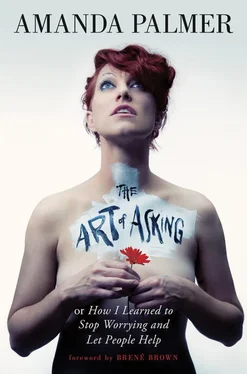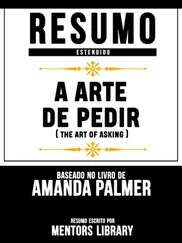But that doesn’t mean observers are going to stop criticizing artists and their process anytime soon. No less than Henry David Thoreau has been called a poseur.
Thoreau wrote in painstaking detail about how he chose to remove himself from society to live by his own means in a little ten-by-fifteen-foot hand-hewn cabin on the side of a pond. What he left out of Walden , though, was the fact that the land he built on was borrowed from his wealthy neighbor, that his pal Ralph Waldo Emerson had him over for dinner all the time, and that every Sunday, Thoreau’s mother and sister brought him a basket of freshly baked goods for him, including donuts . [6] As I learned from a marvelous talk given by Maciej Ceglowski, awesome founder of the “social bookmarking” site Pinboard, at the 2013 XOXO Festival.
The idea of Thoreau gazing thoughtfully over the expanse of transcendental Walden Pond, a bluebird alighting onto his threadbare shoe, all the while eating donuts that his mom brought him just doesn’t jibe with most people’s picture of him as a self-reliant, noble, marrow-sucking back-to-the-woods folk hero. In the book An Underground Education , Richard Zacks declares: Let it be known that Nature Boy went home on weekends to raid the family cookie jar .
Thoreau also lived at Walden for a total of two or three years, but he condensed the book down to a single year, the four seasons, to make the book flow better, to work as a piece of art, and to best reflect his emotional experience.
I told this story to Sam over our coffees.
Poor Thoreau , said Sam, shaking her head. The donuts are totally the mai tai .
• • •
Taking the donuts is hard for a lot of people.
It’s not the act of taking that’s so difficult, it’s more the fear of what other people are going to think when they see us slaving away at our manuscript about the pure transcendence of nature and the importance of self-reliance and simplicity. While munching on someone else’s donut.
Maybe it comes back to that same old issue: we just can’t see what we do as important enough to merit the help, the love. Try to picture getting angry at Einstein devouring a donut brought to him by his assistant while he sat slaving on the theory of relativity. Try to picture getting angry at Florence Nightingale for snacking on a donut while taking a break from tirelessly helping the sick. It’s difficult.
• • •
So, a plea.
To the artists, creators, scientists, nonprofit-runners, librarians, strange-thinkers, start-uppers, and inventors, to all people everywhere who are afraid to accept the help, in whatever form it’s appearing:
Please, take the donuts.
To the guy in my opening band who was too ashamed to go out into the crowd and accept money for his band:
Take the donuts.
To the girl who spent her twenties as a street performer and stripper living on less than $700 a month, who went on to marry a best-selling author whom she loves, unquestioningly, but even that massive love can’t break her unwillingness to accept his financial help, please…
Everybody.
Please.
Just take the fucking donuts.
• • •
You can never give people what they want , Anthony said.
What do you mean?
We were lying by the side of Walden Pond in Concord, two towns over from Lexington, where we’d created a ritual of ambling around the circumference of the water, then lazing under the trees with a picnic for a nice long grok.
People always want something from you , he said. Your time. Your love. Your money. For you to agree with them and their politics, their point of view. And you can’t ever give them what they want. But you—
That’s a dreary worldview.
Let me finish, clown. You can’t ever give people what they want. But you can give them something else. You can give them empathy. You can give them understanding. And that’s a lot, and enough to give .
• • •
As Sam and I sat in the café, pondering the donut and mai tai dilemmas of all artists, we were joined by Xanthea, who had first introduced us to each other. Xanthea and I had met a few months before, bonding at a wonderful Kickstarter house party she’d organized in her parents’ backyard in Perth.
Xanthea was twenty-two, worked at a bookstore, didn’t want to finish college, organized indie rock shows in laundromats, wrote songs on various instruments, and was a living statue on the side, clad all in white, wearing an old-fashioned sundress, handing out flowers. I’d gone to see her a few days before, where she was performing on Flinders Street, and watched from a distance as she was ignored, loved, ignored, loved again. When I finally dropped some money in her hat, we shared a conspiratorial gaze—the secret statue society. I was proud of her. At the house party, we had shared tales of living-statue hardships, and she’d told me about being harassed by perv-y drunks, and about the time a girl poked her hard in the ribs with a flute. She toughed it out. My kind of girl.
She sat down next to Sam and ordered a coffee, and we explained Thoreau and the donut kerfuffle. Xanthea said she could totally relate. She was just starting to play small gigs and didn’t know how to handle the business side.
I’m getting offered all these gigs in Perth, they’re offering me actual MONEY to play my stupid songs, not a LOT, but I don’t feel like I should take any money… not yet. I think I’m not ready. And it’s even less fair because I’m not, like, a BAND yet. I’m just a person .
I got what Xanthea was saying about the Band Thing. Taking money on behalf of a group, a band, a company—any entity larger than yourself—feels very different from taking money on behalf of YOU.
When I took the step from playing my few-and-far-between solo shows to playing in The Dresden Dolls with Brian, I felt a huge difference between asking people to listen to ME and MY songs and help ME ME ME, versus helping our BAND. It felt very different to hand someone tapes whose front cover proclaimed AMANDA PALMER as opposed to saying: I’m in a band, here’s our CD .
One felt selfish, the other felt legitimate.
Right before I met Brian, I’d started putting “Amanda Palmer and the Void” on my gig flyers. I figured nobody could argue with that on technical grounds. I had a backup band of approximately no people. (I’m not the only one who’s done it. See: Marina and the Diamonds, Tracy and the Plastics.)
I discovered more recently that this experience has been studied, and not surprisingly, it’s a particularly female problem.
In 2010, Emily Amanatullah, a graduate student in management, did a research simulation in which men and women had to negotiate starting salaries in different scenarios.
When the women negotiated for themselves, they asked for an average of $7,000 less than the men did. But when they negotiated on behalf of a friend, they asked for just as much money as the men did. Amanatullah found that women were concerned about “managing their reputation,” worried that pushing for more money would “damage their image.” And other research shows it’s a justified fear, that both male and female managers are less likely to want to work with women who negotiate during a job interview.
On the other hand, when they had to negotiate on behalf of someone else, they presented far higher counteroffers. The upshot? Women were in fact excellent negotiators. They didn’t feel comfortable using their negotiating skills for themselves , but they felt fine asking on behalf of others .
Читать дальше












